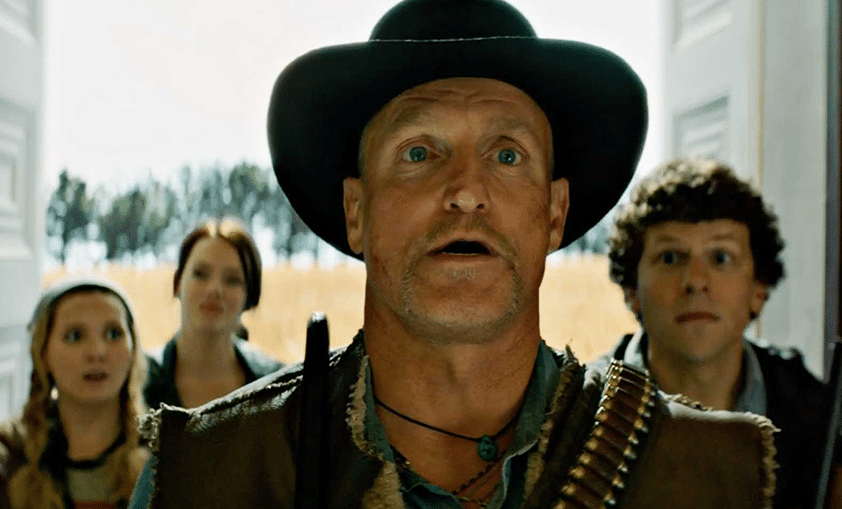Is “Zombieland: Double Tap” worth a fall date night? Yes, with some caveats.
Those who can handle gross-out violence played for laughs and a fair amount of foul language should find “Zombieland: Double Tap” a funny and exciting time at the movies that is not too difficult for those unfamiliar with the original 2009 film to follow.
It’s great to see its four Oscar-nominated leads having a blast in an unpretentious popcorn movie. Even better, it has positive messages about marriage and family. Surprisingly, the film also has a conservative take on gun control. That should surprise most viewers who think Hollywood is simply a hotbed of liberalism. The movie features a strong yet subtle positive attitude towards Jesus and salvation.
Woody Harrelson, Jesse Eisenberg, Emma Stone, and Abigail Breslin team up for another wild adventure battling the undead. They try to find and save the youngest girl of the group after she runs away with a new boyfriend.
The movie starts off fast. Columbus (Jesse Eisenberg) provides the archly comic narration that propelled the first movie. The lead foursome consists of himself, Little Rock (Abigail Breslin), Wichita (Emma Stone) and Tallahassee (Woody Harrelson). Each of them are named after their hometowns. They’ve all improved on their ace zombie-killing skills during the past decade of living in a post-apocalyptic America.
Wildly comic, “Zombieland: Double Tap” is rooted in family

The four live a relatively blissful and safe life by taking over a long-abandoned White House. They enjoy a funny form of family life together. Columbus and Wichita have long been a couple. Tallahassee–the battle-hardened, mercenary-style father figure to the three younger members–has given up on finding love. The youngest, Little Rock, has turned twenty-one without ever having had a boyfriend. She’s getting restless.
When Columbus proposes marriage to Wichita, she at first is scared by the prospect. She says that all she ever knows about marriage is that it leads to divorce. She disappears by morning with Little Rock, who’s her sister. The two soon run into a young hippie musician named Berkeley who immediately woos a fast-smitten Little Rock.
Little Rock and Berkeley escape together, heading for what Wichita believes is Graceland while leaving Wichita behind. In the month that she was gone, Columbus has taken up with Madison (Zoey Detuch). When Wichita convinces Tallahassee to race against time to save Little Rock from an uncertain fate with the unknown Berkeley, an extra level of comic tension between the two women adds to the fun.
They believe that Little Rock and Berkeley are heading for Elvis Presley’s former estate at Graceland. But things are not what they appear to be. Instead the couple are heading for a hippie commune called Babylon much further West. They set themselves up for great danger from a new, more indestructible mutation of zombies.
Infectious fun and positive messages

“Zombieland: Double Tap” has impressively kept its Oscar-nominated cast together, as they show their willingness to have fun even as many of their award-nominated contemporaries ruin their careers by only pursuing pretentious acting jobs (here’s looking at you, Jennifer Lawrence!). All four of them are having a blast (pun intended) as they engage in another round of traveling comic mayhem, combined with fun character interactions as each well-drawn character plays perfectly against each star’s image.
There is a little bit of seen-it-before feeling in this film, after the incredibly original spirit of the initial “Zombieland” a decade before. The new movie also lacks the tremendous surprise of having Bill Murray playing himself as a zombie-apocalypse survivor, in one of the greatest cameos in movie history during the first movie.
The movie has tremendous amounts of violence and bloodshed, but writers Dave Callaham, Rhett Reese and Paul Wernick (the latter two of whom have created the “Deadpool” films in the intervening decade) and director Ruben Fleischer–who were all involved in the same roles in the first movie–have an impressive mastery of how to keep the action so ridiculously over the top that adults can’t help but laugh. However, the violence combined with frequent foul language and a casual yet discreet attitude towards premarital sex make this a movie that no one but adult audiences should see.
Perhaps the most refreshing aspect of “Zombieland: Double Tap” (a reference to the “double tap” slang term of the first movie, which means that one has to shoot a zombie twice to ensure they die) is its surprising messages in favor of guns for self-defense and mocking of PC culture throughout. While one character jokes that she knows how to “work around Jesus” to alleviate the guilt of the young male lead in having sex with her, the movie clearly mocks her stupidity, rendering her a vapid character who’s not a heroine.
Later in the movie, the film shows a road sign saying “Jesus Will Save You” in an extended closeup that pans across the screen. This is a shot that had to be intentional, even if it’s unclear who made that decision. Ultimately, the movie has positive attitudes about marriage, family, and self-sacrifice.
The unusual mix of positive elements with incredible violence and plentiful foul language makes “Zombieland: Double Tap” a movie some may choose to avoid. But those who know what they’re in for will likely find themselves extremely entertained.



